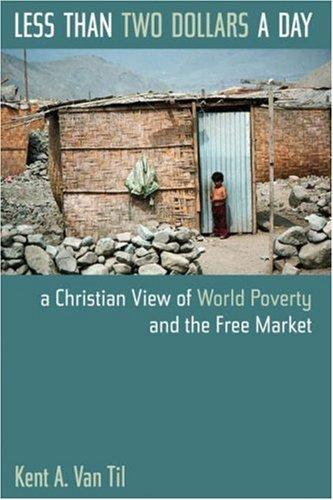A Christian View of Poverty and the Free Market
Kent A. Van Til
Grand Rapids, MI: Eerdmans Publishing Co., 2007.
pp. 180. $16.00 pb.
ISBN 978-0-8028-1767-9.
This book's title is taken from the fact that about 40% of the world's population have less than 2$ per day to live on. See, for example:
Van Til shows how the free market is unable to help those in desperate poverty. The free market distributes goods on the basis of desert - what you can pay for - rather than needs. The first chapter examines the key terms and definitions and then in chapter two Van Til examines the origin and role of the free market. He also highlights some of the often undisclosed assumptions of the free market. The next chapter reveals why the poor don't gain from the free market's distribution. He argues that the free market is not designed to provide basic sustenance and examines six reasons why it is unable.
In chapter four he carefully, albeit briefly, examines what the Bible says about poverty. He ably shows that the biblical mandate requires that we provide basic sustenance for all. Particularly helpful is his discussion of the phrase 'the poor you will always have with you'. This is not a pretext to dismiss our care of the poor to take such an attitude is to face the same condemnation that Judas and the disciples incurred. As, he goes on:
Elsewhere in the New Testament, Jesus regards compassion for the needy as the standard of genuine righteousness. In the end-times tale of the sheep and the goats (Matt. 25:31–46), Jesus insists that feeding the hungry, clothing the naked, and showing hospitality to the stranger are norms of righteousness. The parable of the rich man and Lazarus condemns the rich man not for a particu- lar act of theft or fraud but for his general neglect of the poor Lazarus (Luke 16:9–31). The parable of the rich fool (Luke 12:13–21) shows just how futile constant accumulation can be. In Luke 12:33, Jesus tells all his disciples (not only the rich young man), “Sell your possessions and give to charity.” In a similar vein, James insists that caring for orphans and widows constitutes true religion (James 1:27). In passages such as these, we see that doing justice requires more than passively doing no harm to our neighbor. It requires, rather, that we go out of our way to love the neighbor by seeking out their good, especially the physical good of the poor neighbor. p. 79.Moving from the Bible to the contemporary context is the topic of the next chapter. Here Van Til builds bridges by connecting the scriptures to theological traditions, to economic definitions of basic needs and contemporary political language. From this he maintains that sustenance is a basic right that implies a duty for contemporary society.
In chapter 6 he draws upon Abraham Kuyper's sphere sovereignty and Michael Waltzer's spheres of justice to provide a way forward for workable approach to distributive justice. In the final chapter acknowledging the works of Bob Goudzwaard and John Tiemstra he shows what can be accomplished with a theory of distributive justice.
This book is a thoughtful and thought-provoking approach to a Christian view of the free market and to poverty. For as little as $100 a year we can make a difference to those on $2 a day.



2 comments:
Thanks. I'm Kent Van Til, and you have nicely captured what I was doing there. I will have a new book out on Christian ethics soon.
Thanks for dropping by Kent - I'll look forward to seeing the new book.
Post a Comment